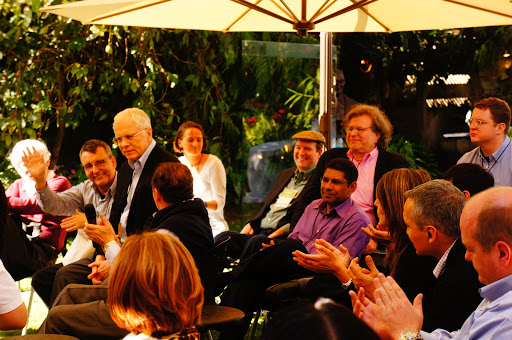 Call it the “Free Market Davos.” The Antigua Forum, sponsored by Universidad Francisco Marroquín, in Guatemala, finished its third annual conference last week. For three days, I had the privilege of joining a who’s who of 50 free-market reformers, hailing from Chile to Mozambique, to propose, challenge, and refine a dozen plans for peaceful revolution around the world. I’ve been going to conferences for almost 40 years and I’ve never seen one harness the power of spontaneous order so effectively, tapping the expertise of such a diverse range of participants.
Call it the “Free Market Davos.” The Antigua Forum, sponsored by Universidad Francisco Marroquín, in Guatemala, finished its third annual conference last week. For three days, I had the privilege of joining a who’s who of 50 free-market reformers, hailing from Chile to Mozambique, to propose, challenge, and refine a dozen plans for peaceful revolution around the world. I’ve been going to conferences for almost 40 years and I’ve never seen one harness the power of spontaneous order so effectively, tapping the expertise of such a diverse range of participants.
After I got over the “what am I doing here?” feeling that washed over me from reading the participant bios, I realized that scar tissue earned in the world of technology entrepreneurship might offer relevant lessons. Indeed, these lessons were eagerly absorbed by passionate social entrepreneurs committed to political and economic disruption fueled not by mobs or guns but by voluntary cooperation, promising not just hope and change but measurable economic benefits. I stood in awe when I realized the seriousness of their plans to go forth and do it, in countries both rich and poor.
While the contents of the conference are “off the record” two projects stand out, which I’ll relate with permission from the participants. The first, now coming to fruition in Honduras, is legislation allowing communities to reorganize themselves into Legal, Economic, Administrative, and Political (LEAP) zones. While respecting national sovereignty and existing private property, these zones, called ZEDEs for their Spanish acronym, are carefully insulated from the prevailing corruption, cronyism, crime, and dysfunction that beset many developing countries.
The goal is to attract entrepreneurs and investors seeking rule of law, predictable tax and regulatory burdens, transparent administration, and self-enforcing guarantees that assure the whole thing won’t get overturned with the next election. LEAP zones seek not to impose solutions from above, but to create the conditions to allow the people who live or come there to work their way up into the middle class. Let a hundred little Hong Kongs bloom!
While I’d read much about LEAP zones—whose roots can be traced back to enclaves like Honk Kong, Singapore, and Dubai—it was exhilarating to participate in a work session with one of the co-designers of the Honduras project, Mark Klugman, who looked a bit like the dog that finally caught the bus. He and his partners Octavio Sanchez and Ebal Diaz have completed much of the heavy lifting required to get the project to the starting line, but the hard work of marketing and execution awaits.
The second project, Contract Cities, aims to attack problems closer to home, transforming municipalities into efficiently run communities with satisfied citizens, revitalized infrastructure, budget surpluses, fewer unfunded liabilities, and even politicians (gasp!) whom voters happily reelect with margins north of 80 percent. (And no, I’m not talking about North Korean-style “elections.”)
Contract Cities is the brainchild of retired AT&T executive Oliver Porter, who was drawn into the reform business by volunteering in his own community of Sandy Springs, Georgia. With five contract cities under his belt, Oliver has developed a predictable and repeatable process whereby newly incorporated or existing municipalities can contract out everything but schools, police, and fire services to professional service corporations, who must win the business through structured competitive bidding. With a potential market in excess of $90 billion a year considering cities with populations between 10,000 and 250,000, contract cities can present many attractive opportunities for corporate America. With more mismanaged cities teetering on the brink of bankruptcy every day, voters are waking up to the dangers of the status quo.
This is not privatization, as no municipal assets are sold or given away. And employment transition plans for existing civil servants can be built into the bidding process. Of course, it won’t work everywhere, particularly in the union-dominated Northeast, where civil service protections resemble those in France. But there are 30 states besides Georgia where existing legislative regimes are compatible with the process. Next stop, Texas!
So, despite what you may hear about Latin America, Bolivarian Blues isn’t the only tune in town. Watch as the Antigua Forum and Universidad Francisco Marroquín keep the flame of liberty alive, even as it flickers at home.
Source: Forbes











[…] GUATEMALA The Antigua Forum: Exporting A Different Kind of Latin American Revolution […]